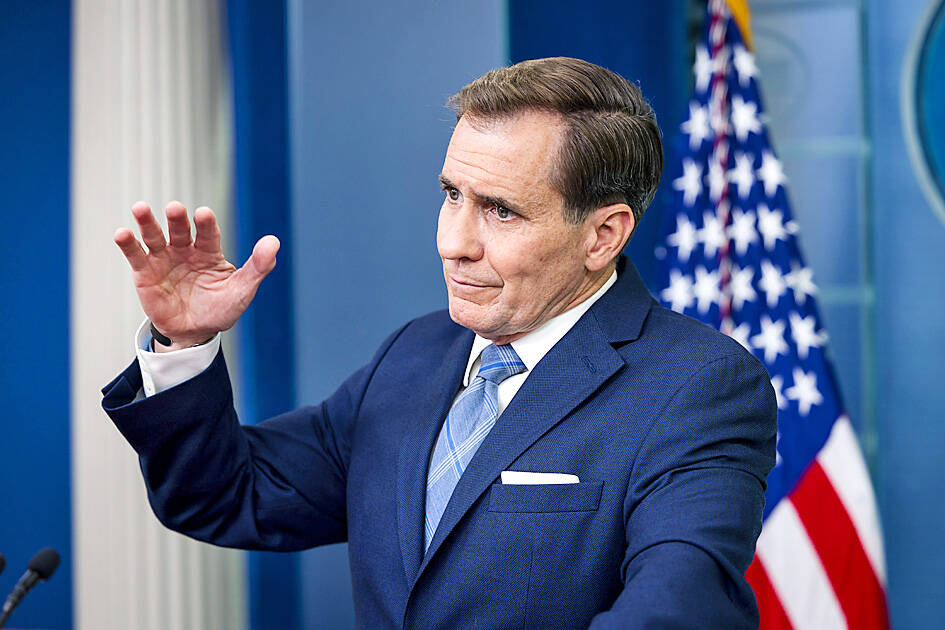Military interception maneuvers by Chinese ships and planes suggest a “growing aggressiveness” from Beijing and risk an accident that could result in injury, the White House said Monday.
“It won’t be long before somebody gets hurt,” National Security Council spokesman John Kirby told reporters at the White House. “That’s the concern with these unsafe and unprofessional intercepts. They can lead to misunderstandings, they can lead to miscalculations.”
A Chinese warship crossed the bow of an American warship in the waters of the Taiwan Strait at a distance of around 150 yards, the Pentagon said Saturday. The interception forced the USS Chung-Hoon to take evasive measures. Last month, a Chinese jet crossed the path of a US reconnaissance plane as it was flying through international air space.

photo: EPA-EFE
Kirby said he believed that the Chinese efforts represented “a statement of some sort of displeasure about our presence” in the region. But, he said, the US would continue sailing and flying in the area.
“The vast majority of international economic trade flows through the Indo-Pacific. We’ve got real needs there and we’re going to stay there,” Kirby said.
The incidents come even as US officials – including Central Intelligence Agency Director William Burns – have met recently with Chinese counterparts. But a handshake over the weekend between Pentagon chief Lloyd Austin and Chinese Defense Minister Li Shangfu did not bolster hopes for a thaw in the relationship, with both trading criticism in their subsequent speeches at the Shangri-La Dialogue, a marquee Asia-Pacific security gathering that took place in Singapore on June 2-4.
Kirby on Monday said the US was hopeful that discourse could improve between the two countries. He said the US is making progress in setting up visits to China by Secretary of State Antony Blinken, Treasury Secretary Janet Yellen and Commerce Secretary Gina Raimondo but did not have an update on the timing of those trips.

Seven people sustained mostly minor injuries in an airplane fire in South Korea, authorities said yesterday, with local media suggesting the blaze might have been caused by a portable battery stored in the overhead bin. The Air Busan plane, an Airbus A321, was set to fly to Hong Kong from Gimhae International Airport in southeastern Busan, but caught fire in the rear section on Tuesday night, the South Korean Ministry of Land, Infrastructure and Transport said. A total of 169 passengers and seven flight attendants and staff were evacuated down inflatable slides, it said. Authorities initially reported three injuries, but revised the number

A colossal explosion in the sky, unleashing energy hundreds of times greater than the Hiroshima bomb. A blinding flash nearly as bright as the sun. Shockwaves powerful enough to flatten everything for miles. It might sound apocalyptic, but a newly detected asteroid nearly the size of a football field now has a greater than 1 percent chance of colliding with Earth in about eight years. Such an impact has the potential for city-level devastation, depending on where it strikes. Scientists are not panicking yet, but they are watching closely. “At this point, it’s: ‘Let’s pay a lot of attention, let’s

‘BALD-FACED LIE’: The woman is accused of administering non-prescribed drugs to the one-year-old and filmed the toddler’s distress to solicit donations online A social media influencer accused of filming the torture of her baby to gain money allegedly manufactured symptoms causing the toddler to have brain surgery, a magistrate has heard. The 34-year-old Queensland woman is charged with torturing an infant and posting videos of the little girl online to build a social media following and solicit donations. A decision on her bail application in a Brisbane court was yesterday postponed after the magistrate opted to take more time before making a decision in an effort “not to be overwhelmed” by the nature of allegations “so offensive to right-thinking people.” The Sunshine Coast woman —

BORDER SERVICES: With the US-funded International Rescue Committee telling clinics to shut by tomorrow, Burmese refugees face sudden discharge from Thai hospitals Healthcare centers serving tens of thousands of refugees on the Thai-Myanmar border have been ordered shut after US President Donald Trump froze most foreign aid last week, forcing Thai officials to transport the sickest patients to other facilities. The International Rescue Committee (IRC), which funds the clinics with US support, told the facilities to shut by tomorrow, a local official and two camp committee members said. The IRC did not respond to a request for comment. Trump last week paused development assistance from the US Agency for International Development for 90 days to assess compatibility with his “America First” policy. The freeze has thrown